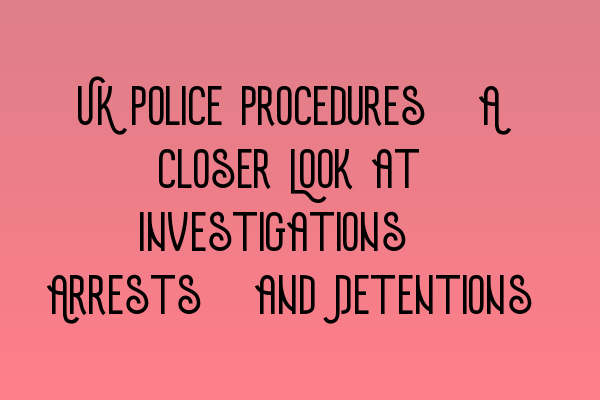UK Police Procedures: A Closer Look at Investigations, Arrests, and Detentions
When it comes to criminal cases in the United Kingdom, understanding police procedures is crucial. This article will provide a closer look at the investigative process, arrests, and detentions carried out by the UK police.
Police Investigations
Before an arrest can be made, the police must conduct a thorough investigation. During this phase, officers gather evidence, interview witnesses, and analyze any available information. This process helps them build a case against the suspect and ensures a fair trial.
Investigations play a vital role in establishing the credibility of the evidence presented before the court. They involve various techniques such as surveillance, forensic analysis, and data collection. Skilled investigators leverage their knowledge and experience to fully understand the circumstances surrounding a crime.
It’s important for the police to follow proper procedures during investigations to uphold the rights of both the victims and the accused. This includes conducting fair interviews, respecting privacy laws, and ensuring all evidence is properly handled and preserved.
Arrests
Once the police have accumulated enough evidence to support a reasonable belief that someone has committed a crime, they can make an arrest. Arrests are carried out to protect the community, prevent further offenses, and ensure the suspect’s appearance before a court.
During an arrest, the police must follow strict legal protocols. They should inform the suspect of the reason for the arrest, their rights, and caution them that anything they say may be used against them in court. It’s essential for the police to handle the arrest with professionalism and respect for the individual’s rights.
After the arrest, the suspect is typically taken to a police station for further questioning and processing. They may be held in custody until a decision is made regarding their release or detention.
Detentions
Detentions are carried out when the police have reasonable grounds to believe that a person needs to be held in custody. This may be due to concerns about the suspect’s risk of flight or interference with the course of justice.
Detainees have the right to legal representation and should be promptly informed about the reasons for their detention. The police must conduct regular reviews to determine whether the detention is still necessary and comply with time limits set by the law.
Throughout the detention, the police must treat the detainee with dignity and respect. They should ensure appropriate facilities, access to legal advice, and necessary medical care.
Conclusion
Understanding the intricacies of UK police procedures in investigations, arrests, and detentions is essential for anyone involved in criminal cases. By following transparent and lawful procedures, the police can ensure the integrity of the justice system.
If you found this article useful, you may also be interested in these related articles:
- Demystifying the Solicitors Qualifying Examination Format
- LLC Formation Made Simple: Step-by-Step Guide for UK Entrepreneurs
- LLC Formation: A Step-by-Step Guide for UK Entrepreneurs
- Business Regulations in the UK: A Comprehensive Overview
- Decoding Corporate Structures: A Comprehensive Legal Insight
